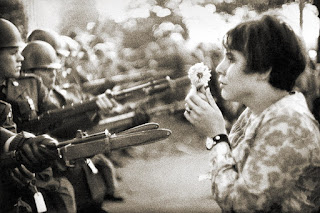Posted by Martin Cohen
It seems like every day, President-elect Trump announces some outrageous new strategy, abandons some long-standing tenet of policy, or upsets long-standing conventions. And that’s of course BEFORE becoming President!You’d maybe have thought, as a businessman, that he’d appreciate the need for research, consultation, and caution,. But if so, you’d not understand the kind of business circles that Donald Trump moves in. He’s not so much a shopkeeper, in the mold of Britain’s Margaret Thatcher, whose father was called (albeit misleadingly) a corner-store grocer and whose motto was expenditures must match savings – as a financier in the mold of, well, Jordan Belfort - the wolf of Wall Street.
Trump is part one of a new breed of super-wealthy and totally unscrupulous financiers whose motto is DISRUPTION. I followed the activities of some of them in the UK, such as Edi Truell, founder and CEO of Disruptive Capital Finance, and the path led eventually to the spreading chaos (and high stock market prices) that is Britain leaving the EU. Where Trump’s plans will go is anyone’s guess – and that’s exactly how he likes it. Because in uncertainly – and upheaval – disruptive financiers make millions.
The film is based on the true story of Belfort - who ultimately came a cropper. But there’s no reason to suppose that possibility is worrying Trump or his circle of friends and advisors – like Britain’s Nigel Farage. To Americans, Farage is the man who persuaded Britons to vote to leave the European Union – but to those who know him better, Farage is a commodities trader whose worked in both London and New York. And Farage’s campaign to get Britain to up-end all its economic and political commitments was supported by a range of other figures from high finance.
Take Richard Tice,. CEO and a partner at Quidnet Capital. and co-chair of Leave.EU the official campaign for ‘Brexit’.
Tice, of course. still insists that leaving the EU can be pulled off without upending the economy. The former head of CLS Holdings Plc, a major property-investment firm, calls it a "very simple process" in which the EU would negotiate a new accord with a separate Britain in one to two years. "I don’t think there’d be any disruption at all." Fellow Brexit campaigners Crispin Odey, founding partner of Odey Asset Management, and former Tory party treasurer Peter Cruddas, founder of online trading company CMC Markets, all look to a new order in which financier s are freed from regulation. Do you remember the financial crisis of 2007-8 – the one that almost brought the Western world to collapse? Well, they evidently don’t. Instead their manta is about seizing control of the levers of political power in order to increase the ability of speculators to make money.
As Vote Leave chief executive Matthew Elliott has said: “Far from the picture of gloom painted by the Government, it is clear the City of London would not only retain its pre-eminence as the world’s most important financial centre, but would also thrive after freeing herself from the EU’s regulatory shackles.”
In both the UK and the US, an influential cadre of super-rich have clear professional reasons for wanting to change the political norms: a dislike for what they regard as overburdensome – and profit-reducing – regulation.
According to one source close to the industry: “I think there’s a genuine conviction they have that all regulation is rubbish.” But, he says, the profit potential from leaving is also a factor: “They love taking a view ... Market dislocation is fine if you’re a hedge fund guy.”
Trump is not so much a reaction to the Obama presidency – as he is to the flood of regulation that followed the 2008 financial crash. And so, to understand what’s coming next ignore all the angry tweets and photo opportunities and instead recall that classic piece of political advice: follow the money. There may be more logic to Trump and his newly assembled band of bankers and financiers’ desire to shake things up than people give him credit for. But it’s the opposite logic to what he claimed to stand for.
And a poem
one drizzled day
donald and nigel
over buttered egos
and hot crumpet
thought to exchange keys
‘you live in my house
& i in yours donald’
said nigel
‘on the contrary
i in mine you inside’
replied donald
From: the booklet: 45th President Elect, by Ken Sequin


















